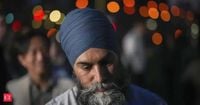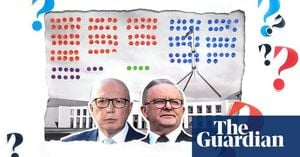BURNABY — NDP Leader Jagmeet Singh conceded the election — and his own seat — early Tuesday morning, congratulating Prime Minister Mark Carney on his win in an emotional speech delivered to a few dozen supporters. Stopping his speech a few times to compose himself, he thanked his caucus and party supporters for the work they've done to bring "real change to the lives of Canadians."
"We did some incredible work together," he said. "Obviously I'm disappointed that we could not win more seats, but I'm not disappointed in our movement. I'm hopeful for our party. I know that we will always choose hope over fear, and optimism over despair, and unity over hate." He also told New Democrats in his home riding of Burnaby Central he would step down as party leader as soon as an interim one is appointed.
As he was speaking with supporters after conceding the election, Singh said he had to avoid making eye contact with certain people "because it's going to get emotional up here." At least a dozen NDP MPs have lost their seats, and preliminary results show the party is unlikely to maintain official party status — which gives a party access to research funding, spots on House of Commons committees and more opportunities to ask questions during question period.
The party held 24 seats at dissolution and needs 12 for official party status, but was several seats shy of that at 3 a.m. Singh also conceded defeat in his Burnaby Central riding, sitting in third behind Liberal Wade Chang, who was declared the winner, and the Conservative candidate. Jenni Kwan is one of the small number of successful NDP incumbents, having held her Vancouver-East seat.
She said she's gone through a party rebuild once before with the B.C. NDP, and is confident it will be done again. "Back at the provincial level, when I was there, we were reduced down to two seats, myself and Joy MacPhail, and what we knew, what we had to do is to reflect and learn the lessons, regain the trust of Canadians, of British Columbians, and to rebuild the party," Kwan said. "And that's what I'm going to be doing in the days and years ahead."
When asked if she's considering interim leadership or seeking the permanent job, Kwan said she is focused on rebuilding the party and representing her riding. The last time the federal NDP lost official party status was in 1993, when it was reduced to nine seats.
Party spokesperson Anne McGrath said those days in the '90s were "very tough" but she remains optimistic about the future. "The big lesson I take from that is that we did rebuild after that. Even now, for instance, we still have a lot of strength across the country. We are either the government or the official Opposition in six provinces," McGrath said. "I'm sad … but I'm not defeated. You know, I was saying earlier, like when Tommy Douglas brought in public health care, medicare, he lost the next election. He used to quote Robert Burns. I remember that loss. And he said, 'I will lay me down and bleed awhile and rise to fight again.'"
NDP officials said earlier in the day they were feeling good about get-out-the-vote efforts and reported internal polling suggesting late momentum gains in Ontario and B.C., where Singh spent many of the last days of the campaign. Rosemont—La Petite-Patrie incumbent Alexandre Boulerice was the first NDP MP declared elected Monday. Heather McPherson in Edmonton—Strathcona and Jenni Kwan in Vancouver East have also been declared elected.
The NDP lost seats and saw incumbents go down to defeat in Windsor and London, Ont., northern Ontario, Winnipeg and northern Manitoba, Alberta and British Columbia. Singh and the NDP spent the election campaign reminding voters of the role they played in introducing the dental care and pharmacare programs in the previous minority government. But Singh's support for Justin Trudeau's government allowed Conservative Leader Pierre Poilievre to launch a pre-election offensive tying him to the unpopular prime minister.
The NDP found itself in a difficult spot in this campaign, caught between the Conservatives and a surging Liberal party in a two-party race dominated by U.S. President Donald Trump's trade war and persistent voter anxiety about the cost of living.
On April 28, 2025, Prime Minister Mark Carney’s Liberal Party won Canada’s federal election, capping a stunning turnaround in fortunes fueled by U.S. President Donald Trump’s annexation threats and trade war, according to Canadian public broadcasters. The Liberals looked headed for a crushing defeat until the American president started attacking Canada’s economy and threatening its sovereignty, suggesting it should become the 51st state. Trump’s actions infuriated Canadians and stoked a surge in nationalism that helped the Liberals flip the election narrative and win a fourth-straight term in power.
As per the Canada's election results website, Liberals are ahead in 158 ridings, while the Conservatives lead in 147. The Bloc Québécois is leading in 25 ridings, the NDP in 10, the Greens in 2, and no seats are currently led by the PPC or other parties. With 52% of polls reporting, the Conservatives have so far secured 114 seats with 53.2% of the popular vote, while the Liberals have won 108 seats with 50.4% support. The Bloc Québécois has claimed 18 seats with 8.4% of the vote, and the NDP has taken 1 seat with 0.5% of the popular vote.
A total of 172 seats are required to form a majority government in the Canadian Parliament. The diplomatic tensions have increased following Canadian Prime Minister Justin Trudeau's allegations last year about Indian involvement in Nijjar's killing, which India has denied. Nijjar, labeled a terrorist by India's National Investigation Agency in 2020, was killed in June 2023, an incident that escalated the tensions between the two nations.
Throughout the campaign, the New Democrats battled a narrative created by consistent opinion polls that suggested their support had collapsed. The Conservative and Liberal campaigns circled eagerly around NDP-held ridings, hoping to pick up seats from a party that was thought to be dead in the water. In a campaign that focused on threats to Canada from U.S. President Donald Trump, and concerns about the cost of living, Mr. Singh seemed relegated to a minor role in a debate between Mr. Carney and Mr. Poilievre.
Singh congratulated Liberal Leader Mark Carney on his victory, stating, "He has an important job to do, to represent all Canadians, and to protect our country and its sovereignty." He vowed that New Democrats would support that effort, emphasizing, "We’re all on Team Canada."
Singh, who led the NDP for more than seven years, faced a difficult task to halt the party’s declining support among Canadian voters. The party peaked in popularity in the 2011 election under leader Jack Layton, who secured official opposition status with 103 seats and 30.63% of the popular vote. However, the New Democrats under Singh were as close to government as the party has ever been. The NDP signed a supply and confidence agreement in 2022 to prop up the Liberal government of Justin Trudeau, claiming that deal allowed them to deliver free dental care for millions of Canadians and pharmacare legislation, which together represent the largest expansion of free Canadian health care in generations. Singh tore that agreement up in September 2024, stating, "the Liberals are too weak, too selfish and too beholden to corporate interests to fight for people."




